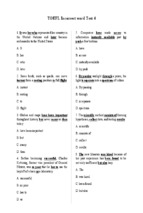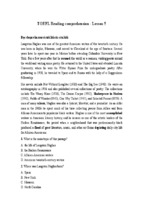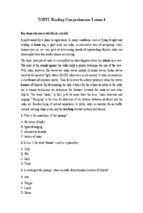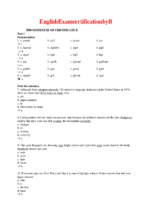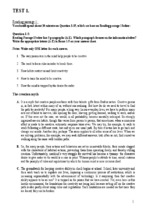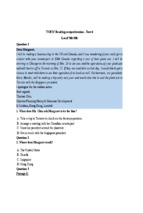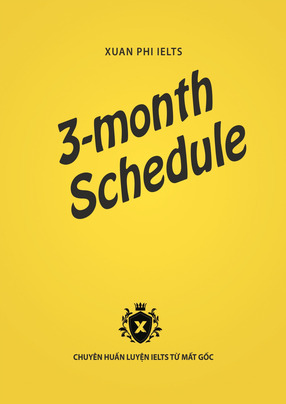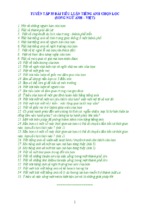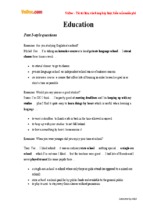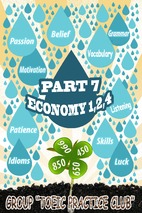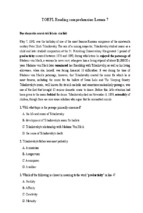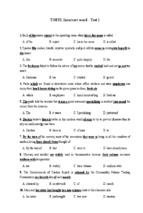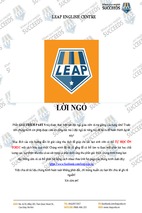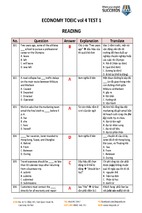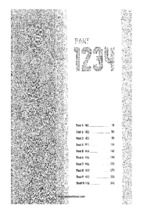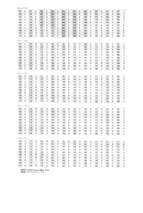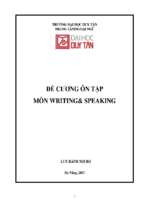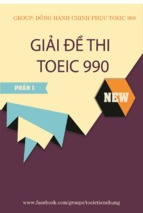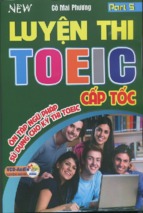Mô tả:
6 min english bbc
BBC Learning English
6 Minute English
Movie science
Callum:
Hello and welcome to 6 Minute English, I'm Callum Robertson and with me
today is William Kremer, hello William.
William:
Hello Callum.
Callum:
Today science in the movies. And we start with a question based on a scene
that will be familiar to many science-fiction fans. If you were in space and
there was a big explosion, what would you hear? Would the sound be:
a: louder than on Earth?
b: quieter than on Earth?
c: there be no sound at all?
William:
I'm going to go for c: there's going to be no sound at all.
Callum:
OK, we'll find out if you're right at the end of the programme.
Well there is science in many films, not just science-fiction films. For example
picture a scene in which there is a petrol station and there is a pool of petrol, or
gasoline, on the ground and a character in the film takes a long suck on his
cigarette and he throws it into the pool of petrol. In the movies, what happens
William?
William:
Booooom
Callum:
In the movies there is a great explosion and in real life, what happens?
6 Minute English
© bbclearningenglish.com 2010
Page 1 of 4
William:
Does it just go out?
Callum:
Yes it does. Apparently – I haven't tried this and don't try this yourself but if
you do throw a lit cigarette into a pool of gasoline, it just puts the cigarette out
and it doesn't explode.
William:
Very disappointing
Callum:
Well it's just one example of how the laws of physics are slightly different in
the movies. But should films be more scientifically accurate? Sidney Perkowitz
is a scientist and author of the book Hollywood Science. He was interviewed
by the BBC on this topic and he was asked how much the science in films
should be based on fact and how much should be based on fantasy and
imagination. What's his opinion and does he think other scientists would agree
with him?
Professor Sidney Perkowitz
Ideally I think should have some of each mixed in, in good proportions. Not everyone would
agree with me. Some scientists would be tighter about it and say every bit of science has to be
wholly accurate. I wouldn't agree with that I think we could allow some flexibility.
Callum:
So William, what was he saying there about science fact versus science fantasy?
William:
Well he was saying that there should be some of both – of both reality and
fantasy – mixed in good proportions, which means in balance, so not too much
one way or the other way. But he did say that not everyone would agree with
him and that some scientists would want every single bit of science to be
correct. He says that he thinks they should allow some flexibility.
Callum:
6 Minute English
Flexibility?
© bbclearningenglish.com 2010
Page 2 of 4
William:
Yes, 'flexibility', meaning not being fixed on one idea. So being able to 'bend'
to include different ideas.
Callum:
Let's listen again.
Professor Sidney Perkowitz
Ideally I think should have some of each mixed in, in good proportions. Not everyone would
agree with me. Some scientists would be tighter about it and say every bit of science has to be
wholly accurate. I wouldn't agree with that I think we could allow some flexibility.
Callum:
So can less than accurate science make for a good film? Professor Perkowitz
thinks so. He mentions one particular film – what was the film about and what
was wrong with the science?
Professor Sidney Perkowitz
One example that I like is a film that in fact got quite a bit of the science wrong but the basic
premise was good and it started a discussion. That was the film called 'The Day after
Tomorrow' which came out, I think, 2004. It's about global warming. It hyped-up the effects,
it made things happen more dramatically and more quickly than they really would but it also
started a conversation, so that to me is a great example of a film that had enough science in it
to have some impact on real world.
Callum:
So William, what was the film about and what was wrong with the science?
William:
The film he mentioned was 'The Day After Tomorrow' and he said it was about
global warming. And he said that although the basic premise was right, the
basic premise – which means the main idea or the main theory – so although
that was correct, the science was wrong in that things happened more quickly
and more dramatically than would really be possible.
And he also said that the effects of climate change were 'hyped-up' which
means they were over-exaggerated, over-dramatised. However despite this he
6 Minute English
© bbclearningenglish.com 2010
Page 3 of 4
thought it was a good film because it started a discussion on important
environmental issues.
Callum:
I have to say I really like that film and I always watch it when it's on. I know
some it is absolute nonsense but still, you know, I do enjoy it. Have you ever
seen it?
William:
I've never seen it, no, I'd quite like to see it now.
Callum:
Let's listen to Professor Perkowitz again.
Professor Sidney Perkowitz
One example that I like is a film that in fact got quite a bit of the science wrong but the basic
premise was good and it started a discussion. That was the film called 'The Day after
Tomorrow' which came out, I think, 2004. It's about global warming. It hyped-up the effects,
it made things happen more dramatically and more quickly than they really would but it also
started a conversation, so that to me is a great example of a film that had enough science in it
to have some impact on real world.
Callum:
Well that's just about all we have time for today. Before we go though, the
answer to this week's question, which was: if you were in space and there was
a big explosion, what would you hear? William you said:
William:
I said c: no sound at all
Callum:
You're absolutely right. Sound can't travel through a vacuum and space is a
vacuum. And on that note, it's time for us to leave you but do join us again next
time for another 6 Minute English. Goodbye.
William:
6 Minute English
Bye bye.
© bbclearningenglish.com 2010
Page 4 of 4
- Xem thêm -


